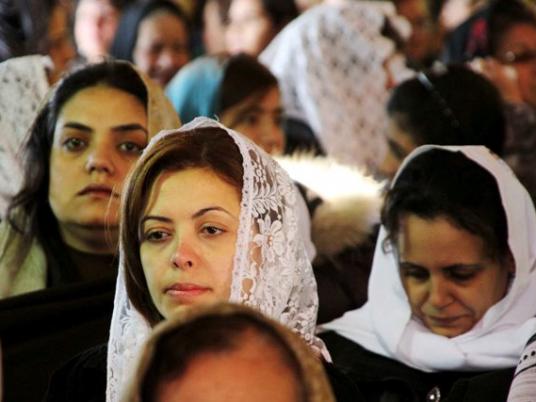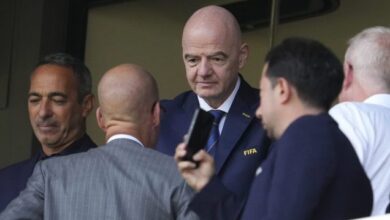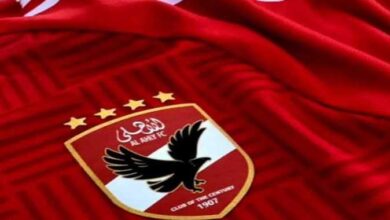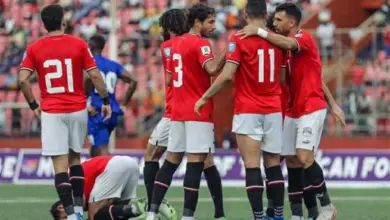
PORT SAID ― Despite a biting wind the sun shone brightly on Port Said Thursday, and if not for the people out in droves in front of the governorate building and marching around the city, no one would guess that unprecedented violence had occurred here just the day before.
The residents of Port Said came out in force Thursday, insisting that the violence in the city's football stadium the night before was something they vehemently condemned, and placing blame for the incident squarely on the shoulders of security forces and local authorities.
The stadium itself still sports debris from Wednesday night's riots, in which 74 people lost their lives in riots after a match between the local team, Masry and Cairo's leading team, Ahly. Strewn across the ground are rocks and shoes people left behind as they ran for their lives.
Trouble brewed in Port Said Stadium early on in the match Wednesday evening, as fans taunted each other and held up provocative signs. Yet the game continued, and after the final whistle fans stormed the pitch and chased rival supporters up the bleachers.
"The situation was very strange," said member of Ultras Masrawy, a group of hardcore fans supporting the city's Masry club, Ahmed Yasser, "to see people dead at a football game. Someone who leaves his house to watch a football match and never comes back, this is something unheard of, I cried all night. This could never come from us."
City residents and football supporters insist that the stands were infiltrated and that the riots were premeditated, pointing to glaring security lapses throughout the game.
Ultra members from both teams had met with the stadium security head and Masry club president Kamel Abu Ali before the match and agreed that there should be no violence. The ultras point to this meeting as proof that they had no intention of stirring up any trouble during the game.
"We usually gather before the game and go sit in our usual place," Yasser said. "When we went there this time we found others there. We usually tell them to leave and this time we did but they said, 'no,' and we didn't want to cause trouble so we sat somewhere else."
From then on, Yasser and others pointed to a series of security failures.
"There was a massive security lapse," said Masry fan Islam al-Sayed. "We saw the supporters storm the pitch and security forces did nothing to stop it. We're accustomed to some trouble happening at games but not like this, not where people will die. At most there is some stone-throwing after the game."
In a precursor of what was to come, fans took to the pitch at halftime in a precursor of what was to come. And curiously, the gates between the stands and the pitch were left open. Some witnesses said that the exits at the back of the stands housing the Ahly ultras were closed. To make things even worse, the stadium lights went out after the match finished. "The gates have always been locked ever since I've been attending the games. They were open this time," Yasser said.
Masry supporters admit that they stormed the pitch at the final whistle to celebrate, but they claim they did not chase after the Ahly fans and players. Another Masry ultra, Mohamed Adel, said, "We were ecstatic with the result [Masry won 3-1]; I did go onto the pitch to celebrate with my team. When we saw what was happening near the Ahly stands we ran to form a cordon at the bottom and prevent more people from going up."
During the second half, Masry fans were provoked by a banner unfurled at the Ahly end casting doubt on the manhood of Port Said residents. "The banner provoked us," Yasser said, "so when we scored the third goal supporters celebrated on the pitch. Missiles [fireworks] were exchanged between us."
"At the end of the game there was one gate that was broken and another one that was already opened. You find the gates open in front of you so of course everybody went down," Sayed said. "Some went to celebrate on the pitch. The others ― the infiltrators ― ran past to chase the Ahly fans. We won the game, why would we attack them?"
Adel also proposed the infiltrator theory, saying that at halftime four buses arrived outside the stadium and unloaded people who took to the stands wearing green Masry shirts. It was they who chased the Ahly supporters, Sayed contended, and "when we saw what was happening we tried to block them at the foot of the pitch in front of the stands."
All of the Masry goals were accompanied by fan invasions of the pitch. The chaos that ensued after the game was difficult to fathom, with Ahly fans finding themselves stuck in a congested area, causing many to suffocate. Others were killed by direct assaults and some even attempted to jump or fell off the top of the stands.
The next day, thousands protested in the streets of Port Said insisting that the violence was not the work of its residents. They pointed out that the governor and head of security were absent from the match, which was uncommon for games against Ahly. Many agreed that those who attacked the Ahly supporters were not regular Masry ultras. Others mentioned that many of the Ahly fans at the game also hailed from Port Said.
The insistent belief that this was the handiwork of infiltrators may seem like a city desperate to exonerate itself from the massacre. But the strange security lapses at the match do raise questions.
Many who attended the match claimed that level of security outside the stadium was actually much smaller than usual. All of this feeds the belief that security forces were somehow involved in at least allowing matters to escalate to such a degree.
"Are you trying to convince me that the police and the military can secure parliamentary elections involving 27 million people and they can't secure two stands with a few thousand people?" Yasser asked. "Tantawi is Mubarak."




